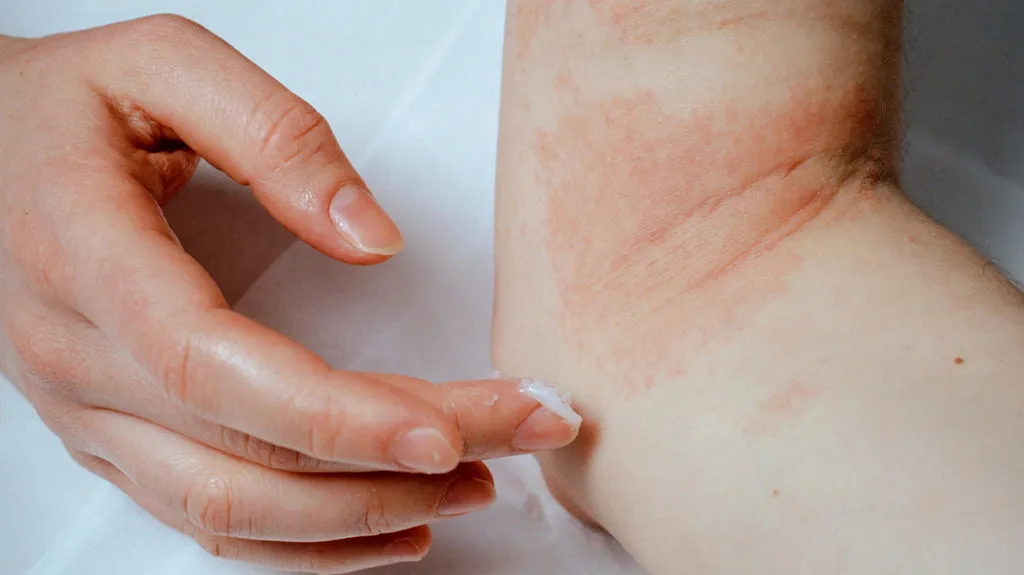What Can Cause Eczema to Become Infected?
It is not uncommon for eczema patches (atopic dermatitis) to become infected. This can happen if the patient scratches or rubs the area causing open wounds or cracked skin to develop on the eczema patches, and then the wounds are exposed to bacteria, fungi or a virus.
The more common sources of infection include:
- Fungal infections, such as Candida albicans
- Herpes simplex virus (HSV)
- Staphylococcus aureus (staph infection)
aureus is a type of bacteria that lives on the skin of 20 to 30 per cent of adults without issue, but it can infect areas of broken skin, such as eczema patches. If a patient gets a staph infection, it can cause eczema to spread more quickly and make healing more difficult.
Albicans can cause fungal infection in eczema and is the most common cause of fungal infections in babies in the nappy area with eczema.
HSV is also known to cause infections in people with eczema. It is recommended that eczema patients keep a safe distance from friends and family with cold sores.
HSV can also cause a secondary infection in the skin called eczema herpeticum. This more severe infection can occur in around 3 per cent of all patients with atopic dermatitis.
Possible triggers
People with eczema tend to have an overactive immune system. This means they can react more severely to topical irritants or allergens, which cause inflammation.
Some eczema is triggered by stress or allergens, such as coming into contact with allergic ingredients in household cleaners, shampoo or shower gel etc., Sometimes eczema is triggered by food allergies, rhinitis or environmental irritants.
Common triggers include:
- Dry skin: Skin gets overly dry, becoming brittle, tight, scaly, or rough, which can lead to an eczema flare-up
- Irritants: Natural or chemical substances which cause the skin to burn and itch
- Stress: Emotional stress and anxiety can be an eczema trigger
Symptoms of infected eczema
Signs of infected eczema can include:
- Blistered skin
- Fluid drainage
- New burning sensations
- Severe itchiness
- White or yellow pus
Infected eczema will usually cause inflammation, swelling, redness and discolouration of the skin. The area may become tender to the touch.
Patients with severe infection can also present with a high fever and chills and other symptoms that mimic the flu, such as body aches and fatigue.
Complications that can arise from infected eczema
Infected eczema can lead to several complications and will depend on the type of infection a person has. Infected eczema may lead to the following complications:
- A staph infection that is allowed to progress can cause blood poisoning
- Growth problems in children from topical steroids
- Herpeticum can cause infections in the cornea of the eye, which could lead to blindness
- Longer healing times for eczema
- Resistance to topical steroids after frequent use
- Scarring
- Worsening eczema symptoms
Are you a healthcare professional that manages skin conditions?
You may be interested in taking our training course on Recognising and managing acute skin conditions in primary care. This online course is specifically aimed at updating and improving the skills of advanced nurse practitioners, nurse practitioners, primary care nurses, practice nurses, school nurses and other allied health professionals.
The course has been designed for practitioners that wish to brush up on the latest clinical approaches to assessing and managing acute skin conditions. Skin conditions such as eczema are commonly seen in primary care, and this course will enable you to identify better and safely manage acute skin conditions in your patients.
Participants will learn how to:
- Develop dermatology assessment skills
- Increase your awareness of the most common acute skin conditions and their management
- Increase your knowledge of differential diagnoses in dermatology
- Improve your knowledge base of dermatological treatments and best practice for their use
- Be more confident in dealing with exacerbated chronic dermatological conditions
- Understand when to refer to secondary care and how to make an appropriate referral



